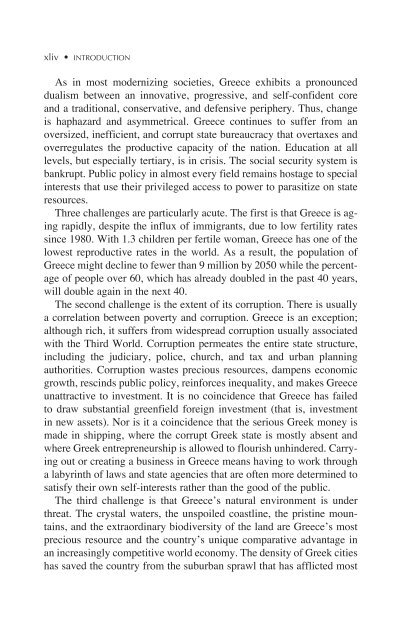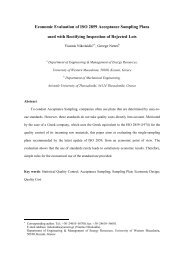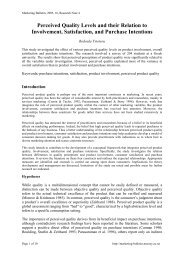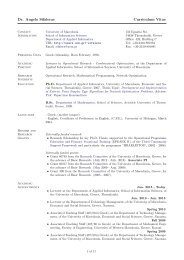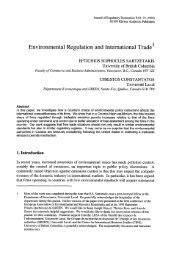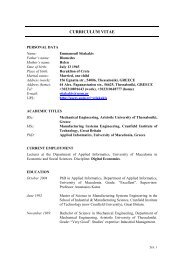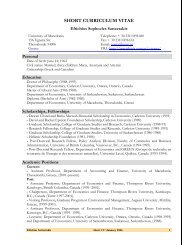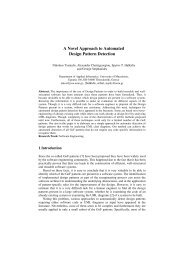HISTORICAL DICTIONARIES OF EUROPE Jon Woronoff, Series ...
HISTORICAL DICTIONARIES OF EUROPE Jon Woronoff, Series ...
HISTORICAL DICTIONARIES OF EUROPE Jon Woronoff, Series ...
You also want an ePaper? Increase the reach of your titles
YUMPU automatically turns print PDFs into web optimized ePapers that Google loves.
xliv • INTRODUCTION<br />
As in most modernizing societies, Greece exhibits a pronounced<br />
dualism between an innovative, progressive, and self-confident core<br />
and a traditional, conservative, and defensive periphery. Thus, change<br />
is haphazard and asymmetrical. Greece continues to suffer from an<br />
oversized, inefficient, and corrupt state bureaucracy that overtaxes and<br />
overregulates the productive capacity of the nation. Education at all<br />
levels, but especially tertiary, is in crisis. The social security system is<br />
bankrupt. Public policy in almost every field remains hostage to special<br />
interests that use their privileged access to power to parasitize on state<br />
resources.<br />
Three challenges are particularly acute. The first is that Greece is aging<br />
rapidly, despite the influx of immigrants, due to low fertility rates<br />
since 1980. With 1.3 children per fertile woman, Greece has one of the<br />
lowest reproductive rates in the world. As a result, the population of<br />
Greece might decline to fewer than 9 million by 2050 while the percentage<br />
of people over 60, which has already doubled in the past 40 years,<br />
will double again in the next 40.<br />
The second challenge is the extent of its corruption. There is usually<br />
a correlation between poverty and corruption. Greece is an exception;<br />
although rich, it suffers from widespread corruption usually associated<br />
with the Third World. Corruption permeates the entire state structure,<br />
including the judiciary, police, church, and tax and urban planning<br />
authorities. Corruption wastes precious resources, dampens economic<br />
growth, rescinds public policy, reinforces inequality, and makes Greece<br />
unattractive to investment. It is no coincidence that Greece has failed<br />
to draw substantial greenfield foreign investment (that is, investment<br />
in new assets). Nor is it a coincidence that the serious Greek money is<br />
made in shipping, where the corrupt Greek state is mostly absent and<br />
where Greek entrepreneurship is allowed to flourish unhindered. Carrying<br />
out or creating a business in Greece means having to work through<br />
a labyrinth of laws and state agencies that are often more determined to<br />
satisfy their own self-interests rather than the good of the public.<br />
The third challenge is that Greece’s natural environment is under<br />
threat. The crystal waters, the unspoiled coastline, the pristine mountains,<br />
and the extraordinary biodiversity of the land are Greece’s most<br />
precious resource and the country’s unique comparative advantage in<br />
an increasingly competitive world economy. The density of Greek cities<br />
has saved the country from the suburban sprawl that has afflicted most<br />
09_152_01_Front.indd xliv<br />
3/30/09 9:45:33 AM


